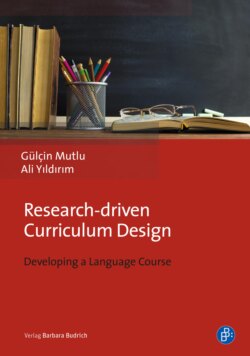Читать книгу Research-driven Curriculum Design - Ali Yildirim - Страница 6
На сайте Литреса книга снята с продажи.
1. Introduction
ОглавлениеThe purpose of the study reported in this book is to develop an advanced level speaking course that will be offered to the freshman students successfully completing the English preparatory program, which was composed of more than 700 hours of English instruction. This target population of students spends their first year of university at the preparatory English school and they have to successfully complete the preparatory school before they start their main faculties. The students at all preperatory classes usually start with the elementary level of proficiency, and they are expected to move towards an upper level of proficiency level within a whole academic year and finally graduate with an upper intermediate to advanced levels of proficiencies. The students are usually aged between 18 and 20 at the preparatory class, and thus for the year that this speaking course is to be offered, students are expected to be generally aged between 19 and 21. To our experience at several universities in Turkey, these students start university after having been exposed to a highly traditional high school period and school culture. That is, they are accustomed to seeing the teacher as an authority as a figure who always provides them with step-by-step explanations of what they are going to do in class. Given the interactional patterns in the classrooms, based upon their earlier experiences at the high schools, they are not very attentive and willing to work with others for their classroom tasks. However, as they spend a relatively more time in the language classroom, they are observed to change their attitudes to a great extend in comparison to their first weeks and behave in a more relaxed and cooperative manner in the classrooms. Therefore, when they come to the advanced speaking course to be designed for the purposes of this study, they are expected to be already accustomed to a cooperative classroom environment, to teachers behaving like a theater director and guide (not like an authority) and treating the students as active course participants. The course to be designed was named as “Further Speaking Course” (FSC) as the main purpose of this course to make students further their speaking abilities that they have already developed a certain level at the preperatory classes. Hence, this course is built upon the understanding that the target students have a certain level of proficiency in English with regard to language forms, lexical knowledge, use of conversational strategies and registers in communication, and certain level of writing and speaking skills in English.
Given the contextual characteristics, the medium of instruction at the university where we designed this course was Turkish in general. However, the courses are offered with the medium of English on a partial basis in some of the departments and the preperatory class is compulsory for these departments. That is, for some departments, the students study 30 % of the courses in their faculty curriculum in English. The course we attempted to design in this project will be offered to those departments that offer their degree curricula partially in English (i.e. with 30 % of English instruction). This course to be designed in this study will be offered as an elective course for those students who want to further develop their speaking skills. However, in the long run, there may be some departments at the university that will offer all of the degree courses with the medium of English, and in this case, the course to be designed can be offered as a must course. The Further Speaking Skills course will meet for four hours a week in the fall term of an academic year when the students start their degree studies upon the successful completion of the preparatory school. This makes a period of approximately four months for the course.
The English preparatory program is a strict program in which students receive instruction concerning all of the four major skills (listening, writing reading and speaking) and the three sub-skills (grammar, vocabulary, pronunciation) of language. Though we follow a communicative approach to language teaching with a focus upon all four major language skills at the preperatory class from the very beginning of the preperatory semester, it takes time for students to come to a level of production in language for both oral and written purposes. To our experience, their competence (knowledge about the language) precedes their performance (use of the language). However, once they have gained the necessary competence and input in English, they are expected to proceed very well. In this regard, as researchers and teachers we assume that these students develop their competencies to a great extent at the preparatory program; however, they still need more practice for the productive skills of language (for their performance in English). Accordingly, having completed the preparatory class, these students have the ability to produce language on most parts, but there still remain some areas of speaking (e.g. like making speeches before an audience, producing longer stretches of spoken discourse and reflecting on the interlocutors’ opinions) for these students to develop further so that they can be fully competent communicators in English. Hence, the Further Speaking Skills course to be developed for this study will answer to this main need. It is also believed that this course will add to students’ proficiency with other language skills in spite of its preliminary specific focus on speaking skills for it is impossible to isolate the skills of a language as supported by today’s latest and current language teaching methodology.
